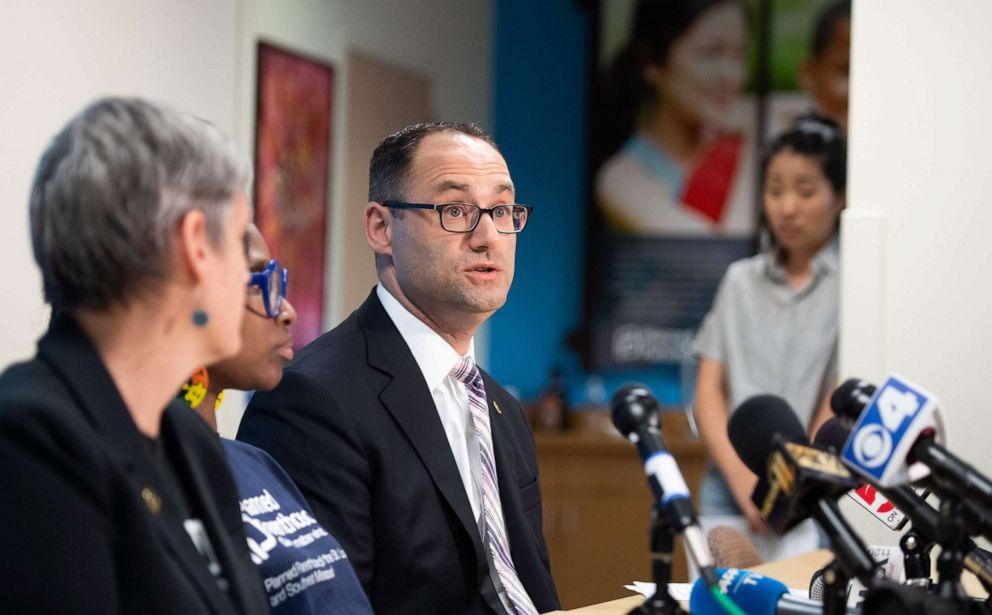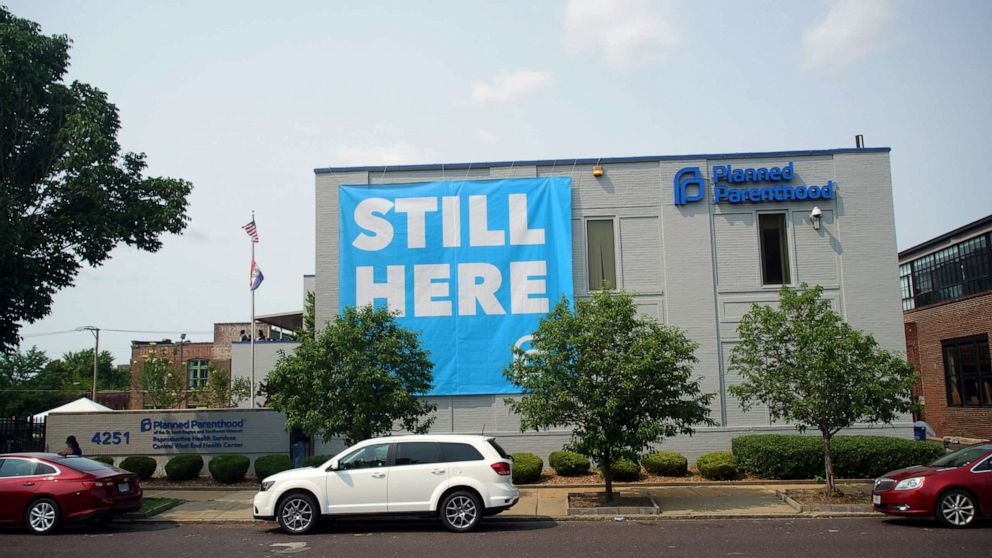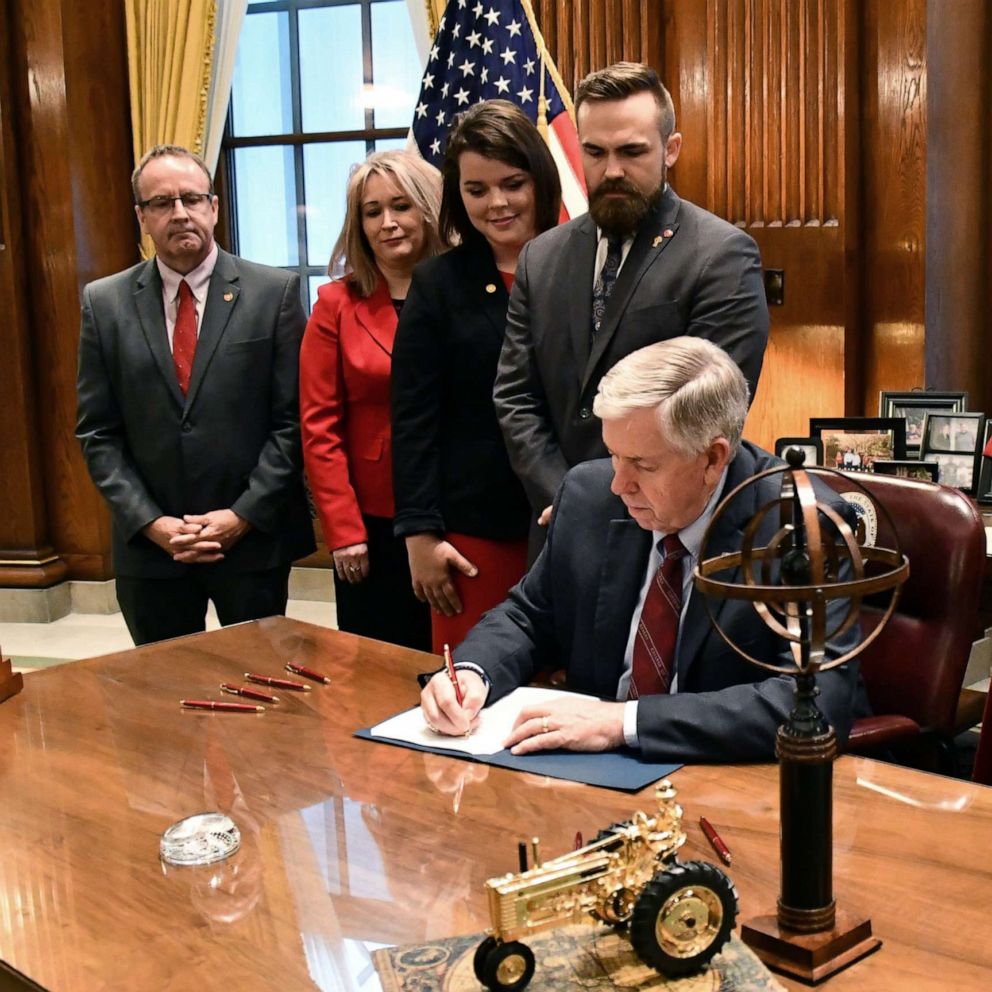Illinois and Missouri are neighbors, but worlds apart on abortion
Activists and concerned citizens across the country have been paying close attention to the ongoing changes to abortion laws in Missouri and Illinois in recent weeks, but two people know the differences better than most.
David Eisenberg and Erin King are married. They are both trained doctors and both perform abortions. And while they both live and practice in Missouri, King doesn't perform abortions there.
Instead, she works at two medical facilities. In Missouri, she is a general obstetrician-gynecologist at a practice in downtown St. Louis. Just across the border in Illinois, she serves as a physician and the executive director at the Hope Clinic for Women, which provides abortions.
"What my husband has to comply with as a gynecologist performing abortions, the regulations are barely insurmountable," King told ABC New. Those regulations, she said, "are the reason why I don't do abortions in Missouri."
To get an abortion in Missouri as of May 2018, patients must hear state-directed counseling in-person and then wait 72 hours to get the procedure, per the Guttmacher Institute, a reproductive rights research group initially formed under Planned Parenthood that has been operating separately for years. Private insurance only covers abortion in cases of life endangerment, telemedicine abortion is banned, and a minor must receive parental consent.
To get an abortion in Illinois, per Guttmacher, the only restriction as of May 2018 is that a minor's parent must be informed.
Missouri and Illinois are the latest example of two states -- in this case, neighbors -- going in opposite direction on an issue as a result of a political dichotomy.
"Every day, we talk about the differences between Missouri and Illinois and how much we realize that in Missouri it's so much harder to provide the care that women need," Eisenberg said.

On the one hand, Illinois will soon be joining several states that moved to protect abortion rights and expand access this year as the state's new governor is expected to sign the Reproductive Health Act into law. That act would get rid of criminal penalties for doctors performing some abortions as well as restrictions on some later-term abortions.
On the other hand, Missouri joined more than half a dozen states in recent months in moving to restrict abortion rights, as the governor signed a law that would ban abortions after eight weeks.
"I believe that in the 10 years that I've been in Missouri, that the politicians that are elected to state office move further and further [to the right]," Eisenberg told ABC News.
He's not wrong: The number of Republican members in the state's House of Representatives has increased dramatically during that period, going from a nearly even split of 88 Republicans and 74 Democrats before the 2010 election to 116 Republicans and 47 Democrats after the 2018 election.
Missouri has had a state government trifecta -- where the House, Senate and governor are all controlled by or of the same party -- for three years.

But since Gov. Mike Parson took over after his predecessor, Eric Greitens, resigned a year into his term, there's been further movement on abortion.
In addition to the eight-week ban, which does not include exemptions for rape and incest, the state's department of health is battling the lone abortion clinic -- which Eisenberg runs -- in court. The abortion ban has been challenged in court and is not yet in place, and a preliminary injunction has been ordered in the case of the abortion clinic, which was allowed to remain open until June 21.
"It's not a surprise that now that these people are in power, that the legislation that's being passed and signed is anti-abortion. These were clear goals laid out in the platforms when people were running," King said.
Even the former chairman of the Missouri Republican Party, John Hancock, who currently works as a political operative, said state politicians "could be" going further than what the residents want.
"Missouri is a pro-life state," Hancock said. "Most people in Missouri are pro-life, [but] I don't think most people in Missouri support outlawing abortion in the case of rape or incest."
Hancock said that while he feels that Missouri "has been culturally conservative for a very long time," a number of residents who used to consider themselves conservative Democrats are now voting for Republicans because, he feels, "the Democratic Party has become more and more liberal."
As an example of Democrats moving "more liberal," anti-abortion advocates point to New York's signing of the Reproductive Health Act, which legalized abortion in the state after 24 weeks if the patient's health was at risk or the fetus was not viable.
Jeanne Mancini, the president of March for Life, told ABC News she believes the New York law "very much contributed to what we're seeing in different states, for example in Missouri."

Illinois, Mancini said, is following in New York's footsteps, to the point she feels anti-abortion activists are "swimming upstream in Illinois." Both states achieved Democratic trifectas in 2019.
"Sadly, if the Reproductive Health Act is signed into law, Illinois will have made themselves into the most leftward leaning state that is wide open to abortion," she said.
For Illinois Gov. J.B. Pritzker, a Democrat who entered office earlier this year, that's exactly the point.
"Illinois is making history, because our state will now be the most progressive in the nation for reproductive healthcare. In Illinois, we trust women to make the most personal and fundamental decisions of their lives -- and now, that will be the law of the land, even as it's under threat in other states," Pritzker said in a statement when the Reproductive Health Act passed on May 31. He said he plans to sign the bill.
Beyond trusting women and doctors, part of the push that drove abortion access protections in Illinois may be geographic, said Elizabeth Nash, a senior policy analyst for the Guttmacher Institute.
"I think Illinois really recognizes where it sits geographically, and it's surrounded by some really conservative states, Missouri being one of them," Nash said.
More than 5,500 women came to Illinois from other states to get abortions in 2017, the Chicago Tribune reported, although their states of origin were not specified.
"In 2017, something clicked in the Illinois legislature, really recognizing the need to protect abortion rights and access, and the appointment of [Supreme Court Justice Brett] Kavanaugh sort of further solidified the recognition that abortion needs to be protected," Nash said.
While the fate of Missouri's law banning abortions remains with the courts, the attitude towards abortion access is not something King or Eisenberg seem to think will change in the immediate future.

In the meantime, King said that even before the ban was signed into law, more than half of the patients at the Hope Clinic for Women just across the border in Granite City, Illinois, were Missouri residents. King noted that Hope Clinic is a 15-minute drive from the Planned Parenthood of the St. Louis Region and Southwest Missouri, where Eisenberg serves as medical director.
For Eisenberg, he sees his work as something of a calling.
"When I came to St. Louis, I came here with the hopes that I could help improve access to care and improve health and well-being of the people we take care of, and I feel like we have done that in spite of the state," he said. "I signed up for this job. I knew what I was getting into when I came to St. Louis."




